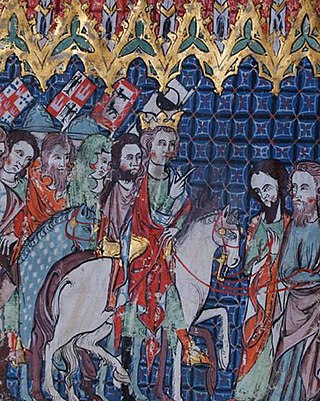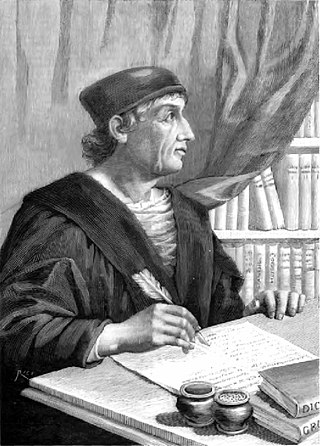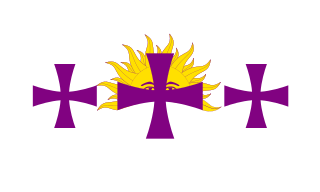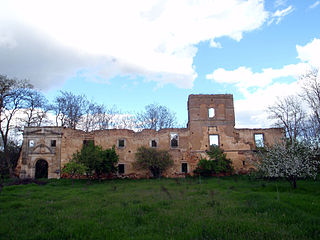Related Research Articles

Pelagius was a Hispano-Visigoth nobleman who founded the Kingdom of Asturias in 718. Pelagius is credited with initiating the Reconquista, the Christian reconquest of the Iberian Peninsula from the Moors, and establishing the Asturian monarchy, making him the forefather of all the future Iberian monarchies, including the Kings of Castile, the Kings of León, and the Kings of Portugal.

Alfonso XI, called the Avenger, was King of Castile and León. He was the son of Ferdinand IV of Castile and his wife Constance of Portugal. Upon his father's death in 1312, several disputes ensued over who would hold regency, which were resolved in 1313.

Alfonso IV, called the Monk, was King of León from 925 and King of Galicia from 929, until he abdicated in 931.

The University of Salamanca is a Spanish public research university, located in Salamanca, in the autonomous community of Castile and León. It was founded in 1218 by King Alfonso IX. It is the oldest university in the Hispanic world and one of the oldest in the world in continuous operation. It has over 30,000 students from 50 different nationalities.

John of Ávila was a Spanish priest, preacher, scholastic author, and religious mystic, who has been declared a saint and Doctor of the Church by the Catholic Church. He is called the "Apostle of Andalusia", for his extensive ministry in that region.

Luis de León, was a Spanish lyric poet, Augustinian friar, theologian and academic.

Henry IV of Castile, nicknamed the Impotent, was King of Castile and León and the last of the weak late-medieval kings of Castile and León. During Henry's reign, the nobles became more powerful and the nation became less centralised.

Antonio de Nebrija was the most influential Spanish humanist of his era. He wrote poetry, commented on literary works, and encouraged the study of classical languages and literature, but his most important contributions were in the fields of grammar and lexicography. Nebrija was the author of the Spanish Grammar and the first dictionary of the Spanish language (1495). His grammar is the first published grammar study of any modern European language. His chief works were published and republished many times during and after his life and his scholarship had a great influence for more than a century, both in Spain and in the expanding Spanish Empire.

Constance of Portugal, was Queen of Castile by her marriage to Ferdinand IV.
There are 76 universities in Spain, most of which are supported by state funding. 24 Spanish universities are private, of which 7 are affiliated with the Catholic Church.

Hispanidad is a Spanish term describing a shared cultural, linguistic, or political identity among speakers of the Spanish language or members of the Hispanic diaspora. The term can have various, different implications and meanings depending on the regional, socio-political, or cultural context in which it is used.

Pedro Fernández de Castro "the Castilian" was a Castilian nobleman, son of Fernando Rodríguez de Castro and Estefanía Alfonso la Desdichada. He inherited the Infantazgo of León from his parents and was mayordomo mayor of Fernando II and his son Alfonso IX of León.

Juan de Mella was a Spanish Roman Catholic bishop and cardinal.
Petrus Martinez de Osma was a Spanish theologian and philosopher, known for his views on indulgences, which he retracted at the end of his life.

Sancha Ponce de Cabrera was a daughter of Ponce Giraldo de Cabrera, and his first wife, Sancha Núñez. She was the wife of the important magnate from the Kingdom of León, Vela Gutiérrez.
Asesinato en la universidad is a 2018 Spanish historical thriller film directed by Iñaki Peñafiel, written by Antonio Asencio and Clara Pérez Escrivá and starring Leonor Watling, Patrick Criado and Fernando Soto. It was released on La 1 and it is set in the Universidad de Salamanca in the 16th century.
The Curiel family is a prominent Sephardi Jewish family.
Juan Antonio Curiel Luna y Tejada was a Spanish intellectual and politician who became the Minister of the Council of Castile and member of the secret Supreme Council of the Inquisition.
Luis Francisco Curiel y Tejada was a Spanish lawyer, diplomat, Mayor of the House and Court, and knight of the Order of Santiago.
References
- ↑ "Curial (or Curiel), Juan Alfonso from the McClintock and Strong Biblical Cyclopedia". McClintock and Strong Biblical Cyclopedia Online. Retrieved 2020-08-13.
- ↑ "Curiel, Juan Alfonso - Scholasticon". scholasticon.msh-lse.fr. Retrieved 2020-08-13.
- ↑ "Juan Alfonso Curiel". uc3m, Universidad Carlos III de Madrid.
- ↑ Curiel, Juan; Hernández, Margarita Torremocha (2012-01-01). Compendio de los felices progresos de la Universidad de Salamanca de Juan Curiel (1717) (in Spanish). Ediciones Universidad de Salamanca. ISBN 978-84-9012-156-6.
- ↑ Dictionary of National Biography: Baker - Beadon. 1885.
- ↑ The General Biographical Dictionary:: Containing an Historical and Critical Account of the Lives and Writings of the Most Eminent Persons in Every Nation; Particularly the British and Irish; from the Earliest Accounts to the Present Time. J. Nichols and Son [and 29 others]. 1812.